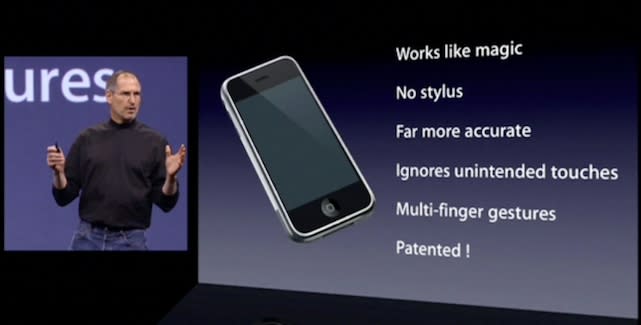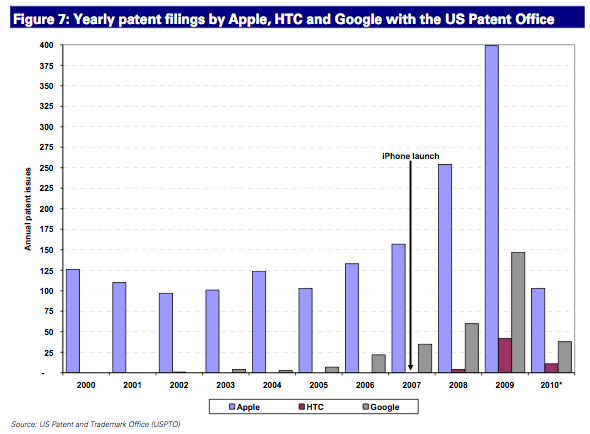When Steve Jobs and Apple started taking patents seriously

Though Apple hasn't necessarily gone "thermonuclear" as Steve Jobs famously promised, the folks over at 1 Infinite Loop have been unapologetically fierce and aggressive about protecting their intellectual property, especially as it pertains to iOS. It's no secret that Apple over the past few years has engaged in patent infringement battles with a slew of top handset manufacturers, and while Apple's legal tussle with Samsung seems to generate the most headlines, recall that Apple in recent memory has also locked horns with Motorola, Nokia, and HTC.
As Apple's legal battles began growing in number a few years back, a commonly voiced opinion was that Apple, and other tech companies for that matter, should spend more time and energy focusing on innovation than litigation. Of course, a common counter to that is that if companies like Apple don't vigorously defend their IP in court, there's no incentive to pour billions of dollars into R&D in the first place.
Apple today has a penchant for patenting everything underneath the sun and aggressively pursuing legal action against those who it feels rip off its technology. This approach, however, is a relatively new phenomenon that can be traced all the way back to the company's 2006 lawsuit with Creative Technology, and entered turbo drive alongside development of the iPhone.
In early 2006, Creative Technology sued Apple with allegations that the company's iPod infringed upon the company's Zen patent which covered a hierarchical menu structure for MP3 players. According to the suit, Creative Technology's assortment of Nomad MP3 players used the menu structure in question a full year before Apple's iPod was released in October of 2001. Not backing down, Apple countersued with claims of its own.
Just a few months later, Apple signed a settlement deal whereby it agreed to pay Creative Technology $100 million for the right to use their patented technology.
Now Steve Jobs is the type of CEO who likes holding onto money, and he was beyond incensed that Creative Technology could just swoop in and extract $100 million out of Apple's coffers. In a press release issued at the time, Steve Jobs telling stated, "Creative is very fortunate to have been granted this early patent."
Following that, Apple got dead serious about patents. This was also due to the fact that Apple at the time was a little less than year into the development of the iPhone. As a result, Apple systematically began bulking up its patent portfolio.
A 2012 New York Times article explained the transformation in detail.
Privately, Mr. Jobs gathered his senior managers. While Apple had long been adept at filing patents, when it came to the new iPhone, "we're going to patent it all," he declared, according to a former executive who, like other former employees, requested anonymity because of confidentiality agreements.
"His attitude was that if someone at Apple can dream it up, then we should apply for a patent, because even if we never build it, it's a defensive tool," said Nancy R. Heinen, Apple's general counsel until 2006.Soon, Apple's engineers were asked to participate in monthly "invention disclosure sessions." One day, a group of software engineers met with three patent lawyers, according to a former Apple patent lawyer who was at the meeting.
The first engineer discussed a piece of software that studied users' preferences as they browsed the Web.
"That's a patent," a lawyer said, scribbling notes.
Another engineer described a slight modification to a popular application.
"That's a patent," the lawyer said.
Another engineer mentioned that his team had streamlined some software.
"That's another one," the lawyer said.
"Even if we knew it wouldn't get approved, we would file the application anyway," the former Apple lawyer said in an interview. "If nothing else, it prevents another company from trying to patent the idea."
Highlighted by the chart below, we see Apple's US-based patent filings really began to skyrocket in 2007, topping 400 in 2009 alone. In 2013, Apple filed 1501 patent applications worldwide.

While Apple ostensibly began its patent filing spree for defensive purposes, Steve Jobs wasn't shy about attempting to leverage Apple's cash hoard and patent portfolio to achieve certain objectives.
One notable example was recently brought to light as a result of the anti-poaching class action lawsuit that Apple and a slew of other tech companies found themselves embroiled in. If you recall, Jobs at the time was concerned that companies like Google and Palm were actively recruiting away talented Apple engineers.
In a particularly tense email exchange, Jobs implicitly threatened Palm with a patent suit if they continued recruiting Apple engineers.
The email reads in part:
It is not just a matter of our employees deciding they want to join Palm. They are being recruited using knowledge supplied by Jon Rubenstein and Fred Anderson, with Jon participating in the recruiting process. We must do whatever we can to stop this. I'm sure you realize the asymmetry in the financial resources of our respective companies when you say: "We will both just end up paying a lot of lawyers a lot of money."
...
My advice is to take a look at our patent portfolio before you make a final decision here.
Interestingly enough, when Palm's business began floundering a few years back, there were rumors floating around suggesting that Apple was considering purchasing the company as a means to get the company's patent portfolio.
That of course never came to pass, but Apple in 2011 did spearhead a consortium of tech companies (nicknamed Rockstar) who together put together a winning bid of $4.5 billion for over 6,000 Nortel patents. Though the winning bid came from Apple, EMC, Ericsson, Microsoft, RIM, and Sony, Robert Cringely reported that "Apple put up $2 billion for outright ownership of Nortel's Long Term Evolution (4G) patents as well as another package of patents supposedly intended to hobble Android."
"At the end of the day," Cringely wrote, "this deal isn't about royalties. It is about trying to kill Android."
Notably, this wasn't a minority viewpoint at the time. Google's David Drummond -- the search giant's Chief Legal Officer -- said at the the time that Apple, Microsoft and others were waging a "hostile, organized campaign against Android."
And lo and behold, a little over two years later, Rockstar (of which Apple is a shareholder) did in fact set their sights on Android. This past October, Rockstar sued Google along with seven other companies that manufacture Android handsets.
Apple and patents today
As it stands today, Apple remains embroiled in legal disputes with Samsung across the globe. Just recently, Apple emerged victorious in its second California litigation against Samsung, though it was awarded far less than the $2 billion it was initially seeking.
Nonetheless, Apple isn't afraid to settle when need be. The company, for example, has reached settlement agreements with Nokia and HTC in recent years. Apple was also willing to settle with Samsung, but the two sides were unable to reach mutually beneficial terms.
Now given the sheer amount of money Apple has spent on litigation, many have expressed the notion that it's simply not worth it for Apple to pursue alleged infringers when the payoff can often be nominal at best. After all, the $120 million Apple was recently awarded in its dispute with Samsung is nothing more than chump change for a company with over $150 billion in the bank.
Nonetheless, Daring Fireball's John Gruber astutely points out that Apple's willingness to go to court has as much to do with punishing infringers as it does with showing would be infringers that the company is willing to go the distance to protect its intellectual property.
That said, I still don't think Apple has any regrets about pursuing this case. It's about the message it sends to all competitors, not just Samsung: We are irrationally protective of our work, and if you wrong us, we will go after you.

